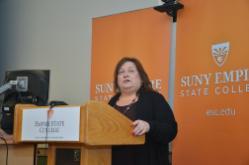This section of the SUNY Empire website is no longer being updated.
View current SUNY Empire Stories.
December 16, 2015
New MOOC Available for Educators – Teaching and Course Design Address Students with Disabilities

More than 2 million New York state residents have a disability.
These people lag behind state residents without a disability by nearly 20 percent when it comes to completing a bachelor’s degree (Center for Independence of the Disabled, 2011).
“Accessibility: Designing and Teaching Courses for All Learners” is a free, six-week professional development course that will help participants gain a better understanding of accessibility as a civil rights issue and develop the knowledge and skills needed to design learning experiences that promote inclusive learning environments for all students, including those with disabilities.
Formatted as a free Massive Open Online Course, and known as “access MOOC,” the course will be presented in a live session beginning on Monday, Feb. 22, 2016, and subsequently will be available in an “on demand” format.
Participants will learn how to:
- recognize and address challenges faced by students with disabilities related to access, success, and completion
- articulate faculty and staff roles in reducing barriers for students with disabilities
- apply the principles of Universal Design for Learning (UDL) in designing accessible learning experiences
- analyze the benefits of Backward Design when developing learning experiences
- use government-wide Section 508 Accessibility Program standards and Web Content Accessibility 2.0 guidelines to create accessible courses
- determine which tools and techniques are appropriate based on course content.
A brief video about access MOOC, including an audio-described version, is available online for those interested in learning more.
Registration for MOOC access is available.
This course was developed and will be taught by a collaborative team, which includes instructional designers, disability services professionals, technologists and faculty members from SUNY Empire State College and Buffalo State College, and was funded by a SUNY Innovative Instruction Technology Grant.
“The demand for online learning has increased exponentially during the last 10 years,” said Kathleen Stone, director for curriculum and instructional design for SUNY Empire and the principal investigator for the grant. “Access MOOC is aligned with Chancellor Zimpher's charge to leverage the flexibility of online learning to increase graduation rates for all student populations, including nontraditional and disabled students.”
Although MOOCs by their nature are provided entirely online, the course content address teaching and learning online, face to face and through a blend of both.
Stone added, “Online learning has the potential to reach learners whose access to higher education might otherwise be encumbered by time, place and space. When a disability is added to the equation, the same tools and designs that we use to provide access to higher education for so many can act as a barrier, if the creation of the teaching and learning environment is not carefully designed.”
Access MOOC comprises modules, which allows SUNY institutions to use any or all of the contents of the course with their professional development programs for all faculty and staff.
Course content also will be marked with creative commons licensing so that users know the content is Open Education Resource ready.
OERs are free and available for use, modification and reuse, to any individual, organization and institution around the world interested in using the content for education.
Participants also will have the opportunity to earn online digital badges, which recognize their mastery of each competency in a specific module, as well as one for the completing the entire course.
Access MOOC employs social media components and participants are encouraged to engage on the course Facebook page and via Twitter using the hashtag #AccessMOOC.